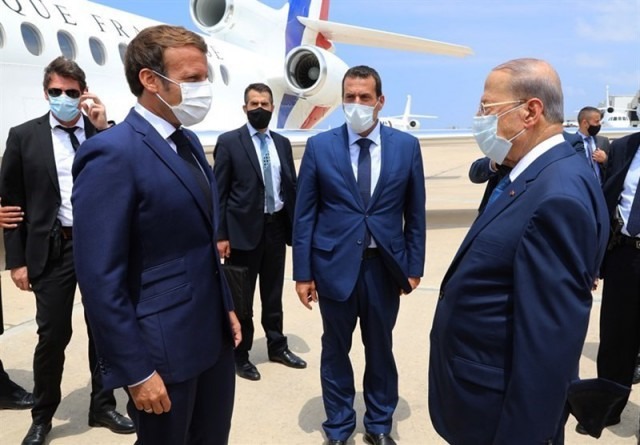Speaking in an interview with the website of the Strategic Council on Foreign Relations, Dr. Seyed Razi Emadi said the recent events in Lebanon turned into an opportunity for the French people to embark on reviving the same historic role. He stated: It seems that Macron still has a colonial look at a country like Lebanon. Lebanon was once a colony of France and in Macron’s recent visit to Lebanon we noticed anything the same colonial view.
Referring to the type of literature the French President used in Lebanon, as well as the type of reaction of the French media circles, he said: Even some analysts and French media stated that Macron’s behavior in his visit to Lebanon was not the behavior of an independent country towards another independent country rather it was the behavior of a European power against a country within its colony!
The analyst of West Asia affairs further added: In the past two or three years, Macron has worked hard to increase France’s role in the world politics. Last year, for example, we saw how hard he tried to meet with Mr. Rouhani and Trump on the sidelines of the UN General Assembly. Such an attitude show that France is seeking a more dynamic, active and appropriate position in the world system. Now, with regard to Lebanon’s background and position for France, as well as Macron’s efforts to promote the status of France, he traveled to Lebanon as the first foreign official to prepare the ground for the flow of foreign aid to Lebanon.
Macron’s visit to Iraq and Lebanon to promote status of France
Emadi continued: The visit Macron paid to Iraq was carried out directly with an aim of promoting France’s status and restoring its influence in that country. If in the case of Lebanon the colonial background plays a prominent role, with regard to Iraq there is a greater desire for playing a role there which provoked Macron to visit Iraq and meet and confer with Iraqi officials.
Stressing that Macron and France still have a top-down view on Lebanon and Iraq, he said: France has made transfer of aid to Lebanon conditional on the implementation of reforms considered by the International Monetary Fund and announced that the aid will arrive in Lebanon only when they can alleviate their domestic political problems.
He also pointed to a kind of realism in France’s approach to Lebanon and said: Although it remains to be seen whether this realism has been coordinated with the US or not, Macron fully understands Hezbollah’s role in Lebanon. For this reason, during his two trips to Lebanon, he talked with the representative of Hezbollah. Unlike some countries, such as Germany and Britain, which are being considered as major European powers, France did not boycott Hezbollah and did not label it as a terrorist organization.
Emadi continued: When some in Lebanon asked Macron to raise the issue of Hezbollah’s disarmament, he stated that our current priority is not disarming Hezbollah and that those who want to disarm Hezbollah under the present circumstances, do not understand the situation in that country. Therefore, a kind of realism is seen in Macron’s literature and discourse regarding developments in Lebanon, especially with the Hezbollah.
According to the university professor, success or failure of France in its approach taken towards Lebanon and Iraq depends primarily on the degree of independence of the country in practice with regard to US.
He explained: If France is to play a role under the US policy, it will not reach success, but if it plans to play independent role of US policy and take an approach without being concerned about the reaction the US will show, in this case it can reach a positive conclusion and result.
Reminding that Seyyed Hassan Nasrallah did not react negatively to Macron’s visit and said, ‘We welcome assistance of France’, the university professor said: This positive approach is when France does not move within the framework of US policies, but if France does not do so and like the US cast the same hostile view on Hezbollah or follows other US policies, then it will not get an answer. But, if it moves independently, it could achieve consequences for the French foreign policy.
France not capable of being independent of the US
He said France’s policy of acting independently in Lebanon was much more effective than in Iraq and citing France’s history of colonialism and influence among some of politicians of this country, referred to France’s ability to act independent of the US in the West Asian region. He said: Basically, there have created severe rifts between European powers and the United States during the four years of the Trump presidency, and there has been a divergence between the US and Europe; but the reality is that Europe has little power over the US.
Referring to more than one trillion dollars trade relations between Europe and the US, Emadi added: However, if the US exerts pressures on France over its policies in West Asia, France will deviate from its policies as it is economically vulnerable and its economic relations with the US is influential in this regard. Unless the US shows signs of accepting these policies or French policies, as a whole, are not far away from the United States.










0 Comments